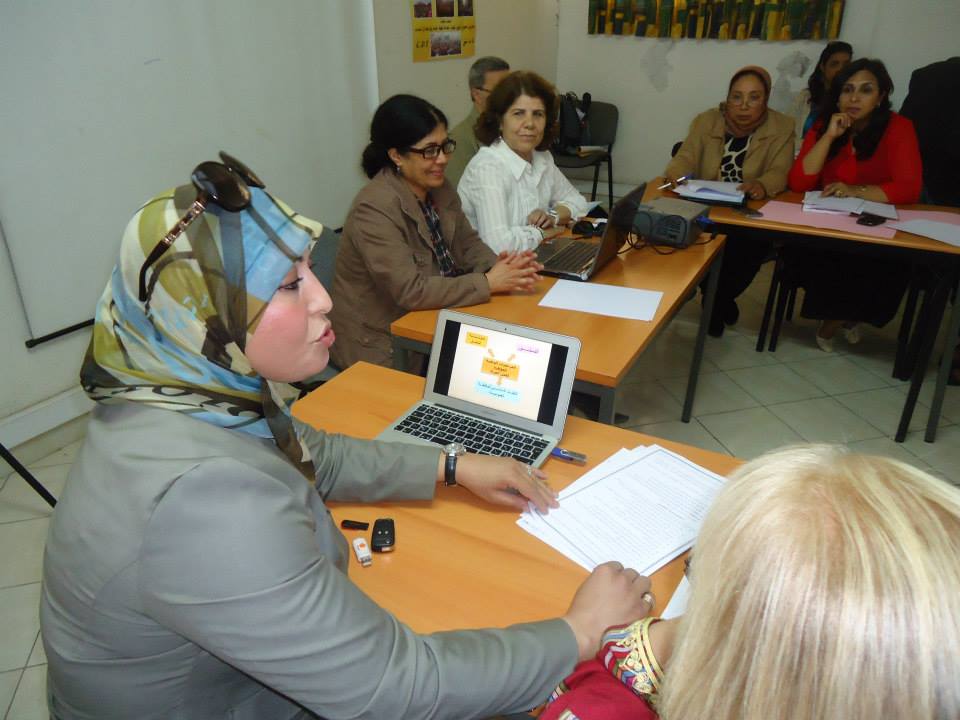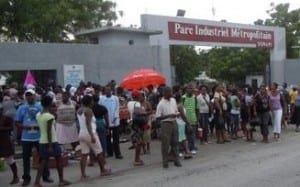
May 13, 2014
In Algeria, Tunisia and Morocco, women are taking concrete steps through unions to achieve social and economic justice and decent work, achievements possible when women are substantively involved in decision-making in their unions, their community and civil society.
In Algeria, the Women’s Committee of the Syndicat National Autonome des Personnels de l’Administration Publique (SNAPAP) has reached out to 600 marginalized and vulnerable women across 11 provinces through educational outreach and study circles. SNAPAP leadership recognizes that despite women’s active social and economic participation, they still face blatant discrimination in their workplaces and communities, harassment, violence, and exploitation on the job.
The Women’s Committee runs study circles with the Regional Algerian Women’s Legal Empowerment Network and with support from the Solidarity Center. During study sessions, the women learn their legal rights under national laws and international conventions. They also are supported in overcoming fears that keep them from challenging repression and violations of their rights, even those often condoned by their societies.
Amid ongoing global economic insecurity, millions of workers are struggling to find jobs that pay a living wage—and the most vulnerable are women, who are more likely to toil in jobs without coverage under formal labor law or social protections, leaving them open to discrimination and exploitation.
The study circles provide a safe place where women can freely talk about their experiences. In recent months, they have described ongoing exploitation in the workplace and at home. All have detailed low wages, long working hours, abusive transfers and dismissals, discrimination, sexual harassment, physical violence and a lack of social protection.
A woman union activist from Adrar, in southwest Algeria, describes how women workers struggle economically in the region, despite the country’s oil and gas wealth. To survive in Adrar, some women work in stone quarries using their bare hands to fill trucks with rocks and gravel for private sellers. Three women recently died from dehydration.
“Surprisingly, all the basic rights that women should enjoy, such as health coverage and decent living wages, are not being enjoyed by women of the south. Some women tried to change their situation through training, but their certificate of completion was rejected by all the businesses and enterprises in the south, which led women to be marginalized,” said the activist. She added that the women, “work in an unsafe environment and are vulnerable to harassment.”
In Tunisia, where women are playing a key role in enshrining articles in the constitution that guarantee equality and parity, women in the Union Générale Tunisienne du Travail (General Union of Tunisian Workers, UGTT) are now working to advance women’s roles in their union. They are uniting under the theme, “Partners in social activism, partners in decision-making,” to highlight their essential role in the country’s 2010–2011 uprising and the subsequent democratic transition. UGTT women are campaigning for creation of a quota that would ensure women comprise a minimum percentage of elected officers and members of UGTT decision-making bodies.
Women union members also have been active in UGTT’s push to remove all of the country’s reservations to the United Nations on the Convention on the Elimination on all Forms of Discrimination against Women (CEDAW). These reservations had enabled Tunisia to opt out of certain provisions, including women’s rights within the family, even though the country had ratified the treaty.
The Confederation Democratique du Travail (Democratic Labor Confederation, CDT) in Morocco is laying the groundwork for a gender advocacy campaign to ensure the consistent application and enforcement of women’s rights. The CDT’s Women’s Committee is laying the groundwork to “give more visibility to the demands of women workers.” The CDT released a memorandum, “Work is a right, with guaranteed dignity and equality,” at a well-attended press conference last month and plans a coordinated workers’ advocacy campaign for women workers.
Apr 8, 2013

UTRASD President Maria Roa Borja seeks to increase membership to better defend domestic workers’ rights. Photo: Borja Facebook page
Afro-Colombian women recently launched the Union of Domestic Service Workers (Unión de Trabajadoras del Servicio Domestíco, UTRASD), the first-ever union in Colombia created entirely by Afro-descendent women.
UTRASD President Maria Roa Borja says she hopes to increase the union’s membership so it can become a powerful actor in defense of domestic workers’ rights. “I am going to give this all my effort … for all Afro-Colombian women, so that the union moves forward and all the rights of all Afro-Colombian women are valued here in Colombia,” Borja told news channel TeleMedellín. The new union was formed through the support of two Colombian nongovernmental organizations, Escuela Nacional Sindical (ENS) and Corporación Carabantú, and the Solidarity Center.
Some 236,000 Afro-Colombians live in Medellin, Colombia’s second largest city. Of these, half are women, many of whom moved to the city in search of economic opportunities. An in-depth study of female domestic workers in Medellin by ENS and Corporación Carabantú, found that nearly a quarter of those interviewed were victims of forced displacement. Further, nearly 98 percent of domestic workers interviewed are single heads of households with children.
“These women suffer from triple discrimination, and in the case of Medellin, almost a quarter are displaced from their territories, which puts them in a situation of greater vulnerability,” Ramon Perea, director of Carabantú, told ENS. “But it is in the workplace that they experience the greatest discrimination.” Domestic workers are especially vulnerable to workplace abuse. Around the world, between 50 million and 100 million people—the vast majority of them women—labor as domestic workers.
The study found that 85 percent of respondents do not have written work contracts. Most are not paid the legal minimum wage nor do they receive overtime. More than half of the women surveyed reported racial discrimination at work.
Feb 26, 2013

Workers outside SONAPI Industrial Park, Port-au-Prince, rallying for decent pay on October 8, 2012. Credit: Susan Washington.
Three years after the devastating 2010 earthquake, Haitian workers are organizing to ensure that foreign investment and infrastructure-targeted aid provide not just subsistence-level jobs, but decent work and a living wage for Haitians.
“We don’t want ‘Haiti Open for Business’ to become ‘Haiti for Sale,’ said Etant Dupain, a Haitian journalist and director of the community organization, Bri Kouri Nouvel Gaye (Noise Travels, News Spreads). Dupain relayed his concerns at a recent panel discussion in Washington, D.C., focusing on worker and community empowerment programs designed to enable Haitians to have a voice in their country’s redevelopment process. The panel was organized by the Solidarity Center and TransAfrica.
Panelists worry that average Haitians—still trying to recover from a series of disasters and a long history of economic and political setbacks—are getting lost in the rush of money and plans from foreign investors and donors, who have not always consulted with Haitians about what is needed. In order to play a stronger role in civil society, Haitian unions are very focused on the need to inform, educate and mobilize workers and the community about their right to participate in the workplace and broader social debates that shape their lives, especially with respect to new economic developments in the country.
Construction of new infrastructure and factories has begun, though hundreds of thousands of people remain homeless. Encouraged by valuable tax and other incentives, including low wages, garment and light-manufacturing tenants are moving into new and existing industrial parks.
International donors and the Haitian government say they want to provide jobs for Haitians. And jobs are sorely needed, said Susan Washington, Solidarity Center country program director in Haiti.
“Haitians are used to working hard; they want jobs. But they must have the right to make these good jobs. Good jobs pay a living wage, respect the right of workers to organize and bargain collectively with employers.”
In March 2011, the Solidarity Center published a living wage survey which found that prices for necessities and basic goods were out of reach for most apparel workers. This remains true today: The cost of living has increased while wages, for those lucky enough to have jobs in the formal economy, have stagnated.
One potential area for job creation is the new Caracol Industrial Park in northern Haiti, which was inaugurated and began initial operations in late 2012. Established as a consequence of trade preferences established under the U.S. Congress’s passage of the HOPE II Act of 2008 and the Haiti Economic Lift Program (HELP) Act of May 2010, Caracol is supposed to support up to 65,000 permanent jobs over time and increase Haitian garment industry related jobs by more than 200 percent. The Solidarity Center estimates that 1,500 workers currently are employed in Caracol, and there are now two registered unions.
Solidarity Center partners are concerned that the park will not create jobs paying workers sufficiently to support their families and rebuild their lives and their country. Caracol is being presented as a model, said Etant Dupain. “If everyone has a place at the table it will be a great project,” he said. But if regulations are not followed and enforced it will set an unfortunate precedent for new industrial processing zones and industrial parks in Haiti.
To help ensure that Haitians have a greater voice in the future of their country, Haitian unions are increasing their capacity to participate in several forums involving the government, employers and civil society. Their participation in these venues is supported by the work of the Solidarity Center and the International Trade Union Confederation -Trade Union Congress of the Americas (ITUC-TUCA) as well as by community organizations supported by TransAfrica’s Let Haiti Live project.
Through their unions, Haitian workers are focused on three key areas: worker and citizen capacity building, social dialogue and labor code reform.
Building Worker and Citizen Capacity: By strengthening the capacity of workers and the community to advocate for and defend their interests through outreach, leadership development and organizing, unions will be well-positioned as independent, democratic and self-sustaining organizations to lead the drive for a better life for Haitian families.
Social Dialogue: Union leaders participate in monthly meetings of a Social Dialogue Table – a tripartite mechanism convened by the International Labor Organization’s (ILO’s) Better Work Haiti project that monitors the factories and provides factory-by-factory data for the ILO’s biannual worker rights compliance reports. Under the auspices of the Commission Tripartite de la Mise en Oeuvre de la loi HOPE—also known as the CTMO-HOPE Commission—union leaders participate in tripartite discussions seeking to resolve problems in the textile and apparel sector in Haiti that are not resolved at the factory level. The Solidarity Center and ITUC both have official observer status in these meetings to lend support to the unions’ perspectives. Both organizations are also providing technical assistance to Haitian unions to raise their capacity to effectively participate in social dialogue.
Labor Code Reform: Haitian unions are active participants in the labor code reform process that is being directed by the ILO. Unions convened workers across all sectors and also worked closely with community associations to gather data for worker input into the tripartite process. Through this process, the trade union movement, employers and the Haitian government have each presented formal proposals to the ILO for changes to the current labor code. The unions’ proposal calls for provisions for the new Haitian Labor Code such as: respect for freedom of association and collective bargaining; distribution of the labor code in Creole; a national minimum wage by sector; coverage of workers across all sectors, including informal and agricultural workers; improved social protections for Haitians, including disability insurance, pensions and health care; banning all forms of discrimination in the workforce; establishment of a viable mechanism for enforcement of the labor code; a small payroll tax to fund capacity building for workers to advocate for their interests; protection of domestic workers; capacity building for government labor officials and the establishment of regional government labor offices.



